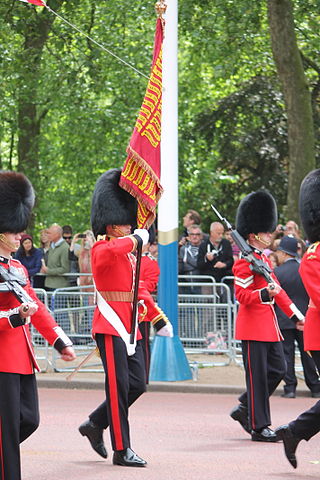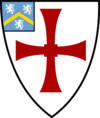
Sporting colours or just colours are awarded to members of a university or school who have excelled in a sport. Many schools do not limit their use to sport but may also give colours for academic excellence or non-sporting extra-curricular activities, Colours are traditionally indicated by the wearing of a special tie or blazer.

The English Cocker Spaniel is a breed of gun dog. It is noteworthy for producing one of the most varied numbers of pups in a litter among all dog breeds. The English Cocker Spaniel is an active, good-natured, sporting dog standing well up at the withers and compactly built. There are "field" or "working" cockers and "house" cockers. It is one of several varieties of spaniel and is the foundation of its American cousin, the American Cocker Spaniel. The English Cocker is closer to the working-dog form of the Field Spaniel and the English Springer Spaniel.

The College of St Hild and St Bede, commonly known as Hild Bede, is a college of Durham University in England. It is the university's second largest collegiate body, with over 1000 students. The co-educational college was formed in 1975 following the merger of two much older single-sex institutions, the College of the Venerable Bede for men and St Hild's College for women.

In military organizations, the practice of carrying colours, standards, flags, or guidons, both to act as a rallying point for troops and to mark the location of the commander, is thought to have originated in Ancient Egypt some 5,000 years ago. The Roman Empire also made battle standards a part of their vast armies. It was formalized in the armies of Europe in the High Middle Ages, with standards being emblazoned with the commander's coat of arms.
In sports or activities in the United States, a letterman is a high school or college student who has met a specified level of participation or performance on a varsity team.

Campbell College located in Belfast, Northern Ireland and founded in 1894 comprises a preparatory school department and a senior Northern Ireland 'Voluntary Grammar' school, the latter meaning, in terms of provision of education, a government funded, selective school.

A blazer is a type of jacket resembling a suit jacket, but cut more casually. A blazer is generally distinguished from a sport coat as a more formal garment and tailored from solid colour fabrics. Blazers often have naval-style metal buttons to reflect their origin as jackets worn by boating club members.

The Regulation Colours are the standard colours used in the armed forces of the countries falling under the Commonwealth of Nations.
An athletic scholarship is a form of scholarship to attend a college or university or a private high school awarded to an individual based predominantly on their ability to play in a sport. Athletic scholarships are common in the United States and to a certain extent in Canada, but in the vast majority of countries in the world they are rare or non-existent.
A blue is an award of sporting colours earned by athletes at some universities and schools for competition at the highest level. The awarding of blues began at Oxford and Cambridge universities in England. They are now awarded at a number of other British universities and at some universities in Australia, Canada and New Zealand.

Team Durham is a student-run organisation responsible for sport at Durham University. In contrast to most British universities it is a separate organisation with the status of a students' union, rather than a part of Durham Students' Union, the primary student representative body at Durham University.
Palatinate or palatinate purple is a purple colour associated with Durham University and the City of Durham. The term has been used to refer to a number of different shades of purple. The Oxford English Dictionary defines it as a "light purple or lavender colour", which is used for Durham academic hoods. For corporate purposes Durham University uses a darker shade.

In association football, kit is the standard equipment and attire worn by players. The sport's rules specify the minimum kit which a player must use, and also prohibit the use of anything that is dangerous to either the player or another participant. Individual competitions may stipulate further restrictions, such as regulating the size of logos displayed on shirts and stating that, in the event of a match between teams with identical or similar colours, the away team must change to different coloured attire.

The Paralympic symbols are the icons, flags, and symbols used by the International Paralympic Committee to promote the Paralympic Games.

Springbok colours is the name given to green and gold blazers awarded to members of the South Africa national rugby union team. They were historically awarded to teams and individuals representing South Africa in international competition of any sport, following their creation in 1906. With the arrival of South Africa's new post-apartheid government in 1994, the name Springbok was abandoned by the various control boards since they felt that the term had been abused by the previous apartheid governments, and stigmatised by the anti-apartheid movement. An exception was made in the case of the national rugby union team, who have retained the practice of awarding colours.
There are a number of universities in Queensland, Australia, all with distinct academic dress.
Cambridge Blue is the colour commonly used by sports teams from the University of Cambridge. There is contextual and historical variation. The colour used since the mid-20th century by Cambridge University Boat Club is greener than that used by Cambridge University R.U.F.C.. This rowing colour was created when Alf Twinn, the boatman from 1934 to 1984, added more yellow to this shade, reportedly to distinguish it from the rugby club's colour.

Oxford Blue is the official colour of the University of Oxford. The official Oxford branding guidelines set its definition as Pantone 282, equivalent to the hex code #002147.
Durham University Men's Lacrosse Club represents the University of Durham in the sport of lacrosse.











